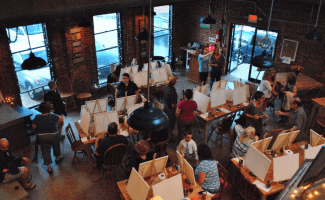Mariposa to Host Panel Discussion on How Refugee Resettlement Works in NH
PETERBOROUGH, NH — Since the mid-1980s, more than 7,500 refugees from Africa, the Middle East, South America, and Asia have resettled in New Hampshire, adding to a centuries-old history of immigration in the Granite State.
On Saturday, April 23rd at 3 p.m., the Mariposa Museum in Peterborough will hold a panel discussion exploring how refugee resettlement works in NH. Discussion will focus on how decisions are made about who and how many people will come to New Hampshire and in which towns they will initially live, how agencies work to ease the transition into NH communities, and what newcomers face when they leave homelands behind to start a new life in the Granite State.
The discussion is free and open to the public. The Mariposa, located at 26 Main Street in Peterborough, is wheelchair accessible.
Panelists will include Barbara Seebart, NH’s State Refugee Coordinator, Amadou Hamady, Executive director of the International Institute of New England (IINE) in Manchester, and Amy Marchildon, Ascentria’s Director of Services for New Americans.
“Refugee resettlement is a familiar topic now in New Hampshire, but many people have questions – and also misconceptions – about how the resettlement process works,” said Mariposa Executive Director Karla Hostetler. “I speak with many people who also wonder how they might get involved. This discussion offers a chance to hear from three of the people most involved in refugee resettlement in New Hampshire and ask these questions.”
Barbara Seebart, NH’s State Refugee Coordinator, has worked on behalf of refugees and immigrants for 24 years. During her 16 year tenure with the state of NH and previously as Executive Director of a private non-profit refugee service agency, she has been active all aspects of resettlement and adjustment, including housing, job development, health/mental advocacy and education, cultural adjustment, English for Speakers of Other Languages, building and empowering ethnic communities, child abuse prevention, parent education, cultural competency and immigration advocacy and counseling.
Originally from Mauritania, Amadou Hamady is the Executive Director of the International Institute of New England/Manchester. With offices in Manchester, Boston, Manchester, and Lowell, IINE has worked for nearly a century to provide refugees and new Americans with tailored services designed to ease adjustment and create a welcoming environment. Hamady was previously Refugee School Impact Program Coordinator and Coordinator of the Humanities After School Program at Saint Anselm College in Manchester. He holds a B.A. in Business Administration from the Faculty of Sciences and Economics of Nouakchott, Mauritania, and a M.S.W. in Social Work from the University of NH/Durham.
Amy Marchildon has 20 years of experience in the field of refugee resettlement. She started her career as a volunteer in Syracuse, NY and then moved to Texas where she became the resettlement director. A brief, multi-partner operation at Ft. Dix, NJ afforded her the opportunity to process Kosovar refugees into the country. She now resides in NH is the Director of Services for New Americans for Ascentria Care Alliance. In 2006, Marchildon participated in the Cultural Orientation exchange in Ghana sponsored by the U.S. State Department. In 2009, she traveled to India and Bangladesh to study the protracted situations of Burmese refugees in both urban and refugee camp settings, and in 2014, she participated in the educational trip to Malaysia sponsored by the Association for Refugee Service Professionals to learn about the plight of Burmese refugees. Marchildon has served on advisory committees to the national resettlement agencies since 2008 and is a member of several local coalitions engaged in integration work for refugees and immigrants. She is a graduate of Colby College.
The Mariposa Museum is located at 26 Main Street in Peterborough, NH. It is a non-profit organization dedicated to fostering peace, global awareness, and understanding across cultural boundaries through exhibits, programs, and regional educational partnerships.
For further information, please visit www.mariposamuseum.org.




